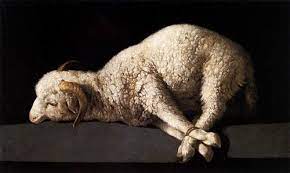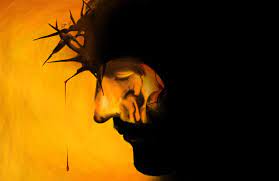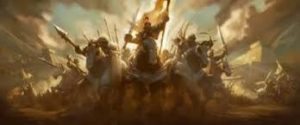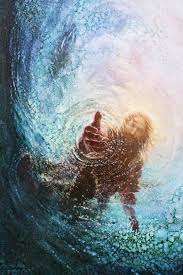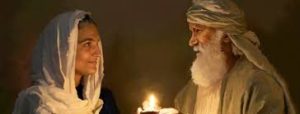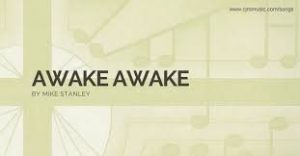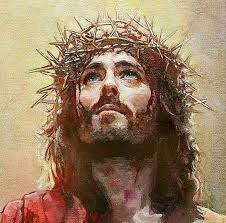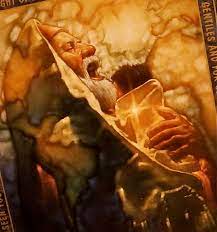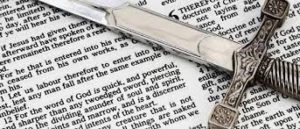Jd – Yet It Was the LORD’s Will to Crush Him, and Cause Him to Suffer 53: 10-12
Yet It Was the LORD’s Will to Crush Him,
and Cause Him to Suffer
53: 10-12
Yet it was the LORD’s will to crush Him, and cause Him to suffer DIG: How is the Messiah’s life a guilt offering? How do you account for the paradox between the death of Jesus in 53:9 and His seeing the light of life in 53:11? 53:7, 10, and 12 use sacrificial imagery to speak of the Servant. How does that make His death more than a mere martyr’s death? How do you get into God’s family?
REFLECT: What is the doctrine of propitiation and what does it have to do with you? How are you justified before ADONAI? The identity of the Servant is no longer a mystery to the reader of this book. The only mystery is how the LORD could love us this much. How does that make you feel? How do you respond to such love? How do you get to heaven? Are you in the boat?
What we have in these verses is the theology of the Suffering Servant just before the Second Coming. What did the whole thing mean? We learn that His death was an offering for sin. Throughout 53:1-9 Jesus Christ seemed to be suffering at the hands of men, but now we learn that ADONAI was actually in control. We learn that it was the LORD’s will to crush Him and cause Him to suffer (53:10a). Why? It was His will to crush Him because through the suffering of the Servant, ADONAI made Messiah’s life a guilt offering (see my commentary on Exodus, to see link click Fd – The Guilt Offering), the most important offering of the Dispensation of the Torah. So Jesus died to become an offering for sin (53:10b).
And because He became a guilt offering by means of His death, there seems to be a contradiction in the minds of some. The Bible teaches us that He will see His offspring and prolong His days (53:10c). How can He see His seed if He dies? How can He prolong His days if He dies? The only way this is possible is by means of resurrection. His offspring are those who will benefit from His death by spiritual rebirth. If we believe in the substitutionary death of the Messiah for our sin, then we are born again spiritually through the Ruach ha-Kodesh. By that spiritual rebirth we become His offspring. And because He has been resurrected, and His days are prolonged, He sees His offspring. And the will of the LORD will prosper in His hand (53:10d). The Suffering Servant will not fail (49:1-4) because He accomplishes the very purpose that God the Father had intended despite opposition by Satan, the Jewish leaders, and the Roman leaders in the physical and spiritual realm. The result of His guilt offering is seen in the next verse.
After the suffering of His soul He will see the light of life and be satisfied; by His knowledge My righteous Servant will justify many, and He will bear their iniquities (53:11). Two important doctrines are seen here. First, is the doctrine of propitiation. After the suffering of His (Jesus’) soul (death), He (God the Father) will see the light of life (Yeshua’s resurrection) and be satisfied (53:11a). The doctrine of propitiation is the averting of the LORD’s wrath by means of the vicarious (substitutionary) and efficacious (producing the desired effect) sacrifice (death) of Jesus Christ (the atonement).
Propitiation is the death of Christ that satisfies every claim of God’s holiness and justice so that God is free to act on behalf of sinners. In Ephesians 2:8-9 Paul writes: For it is by grace you have been saved, through faith – and this is not from yourselves, it is the gift of God – and not by works, so that no one can boast. Because if we could work our way to salvation, ADONAI knows that we would boast. No, it is faith in Jesus Christ that saves us from sin. Works that you do for God cannot save you from sin, because works do not, and cannot pay the penalty for sin. It is not what you do for the LORD that saves. It is what the LORD has done for you. Being a good, moral person cannot pay for sin. Going to church or messianic synagogue does not pay for sin. Only faith in Christ, who shed his blood and died on the cross, can pay for your sin. New Covenant faith consists of two elements. The first element of biblical faith is accepting something as true. In the case of Christ, it is believing (1) that Christ is the Son of God; (2) that Christ died for sin, and (3) that Christ arose from the dead. Do you believe these things are true? Good. The second element in biblical faith is for you to trust Messiah, depend on Messiah plus nothing for the forgiveness of your sins. Let me make this clear. We are saved by faith, that is, trusting Jesus Christ in His death on the cross to get us into heaven.
The atonement of Yeshua Messiah is a unique teaching when compared to other religions around the world. The LORD is Himself the atoner. Every other religion, without exception, teaches that salvation is by works.
ADONAI is going to be satisfied by the death of the Servant. The world says we are all born good and something terrible has to happen for us to end up bad. But the Bible says that we were born with a terminal disease called sin: For all have sinned and fall short of the glory of God (Romans 3:23), and for us to end up righteous, something drastic (salvation) has to happen. As a result, we are all born into the family of Satan. There are only two families in the world, the family of God and the family of Satan. No one is born into the LORD’s family; everyone is adopted into it (see my commentary on The Life of Christ Bw – What God Does For Us at the Moment of Faith).
This is the last of five messages. But in the first message I talked about the lifeboat (see Iz – See, My Servant Will Act Wisely, He Will Be Lifted Up and Exalted). Well, biblical faith is getting in the lifeboat. Are you in yet? If so, that’s great. If not, would you like to accept Christ right now? If so, there is a prayer I would like you to repeat. But before you do I want you to remember that saying a prayer does not save you, trusting in Messiah does. Say these words: God, I admit that I have sinned. I believe Jesus Christ died for my sins, and I want to trust Him to save me right now. If you were to die right now, where would you go? That’s right, heaven. Why should God let you into heaven? That’s right, because Jesus died to pay for your sins.222
Jesus’ last words from the cross were: It is finished (John 19:30). That is the translation in Aramaic because that was the common language of His day. But the original Greek text reads, tetelestai, which means paid in full. This word is actually an accounting term. After the destruction of Herod’s Temple in AD 70, many Jews found their way to Alexandria, Egypt. There they had one of the greatest libraries of the ancient world by the second century. But by then, the international language was Greek. And while the Jews spoke Aramaic, they wrote in Greek, not Hebrew. Archaeologists have discovered an underground storage area there with thousands of clay accounting tablets. Across each one was written tetelestai. It is important for you to understand that your sins have been paid in full by the blood of Christ on the cross. All of your sin, past, present, and future. And as a result, you now possess eternal life (John 6:37-40; 10:27-30).
The second important doctrine is the doctrine of justification. The immediate result of salvation is justification. By His knowledge My righteous Servant will justify many (53:11b). To be justified in God’s sight means that we have a right standing before Him. It is an act where, negatively, He forgives your sins and, positively, He declares them righteous by imputing, or transferring, the obedience and righteousness of Messiah to you. With electronic banking today, if someone transferred a million dollars to your bank account, it would be imputed to your account. That’s what Christ does for us as He transfers His righteousness to our account at the moment of faith. We do not get to heaven on account of our own righteousness. Later, Isaiah will write that all our righteous acts are like filthy rags (64:6). We get to heaven on account of the righteousness of Christ. It is a one-time act of God at the moment of salvation. This is a pretty good trade, our sins for His righteousness.
And He will bear their iniquities (53:11c). How is mankind justified? By knowledge of the suffering Servant. There are two Hebrew words for knowledge. One is head knowledge, and one is experiential knowledge. The word here is experiential. By the experiential knowledge of the Servant will mankind by justified. When we believe that Yeshua is the Son of God who came to bear our iniquities (or sins), when we trust in what Jesus did in His suffering and death on our behalf, and then we can experientially know Him and are justified by His grace. And we are justified freely by His grace through redemption that came through Jesus Christ (Romans 3:24). And in Titus 3:7 Paul writes: So that having been justified by His grace, we might become heirs having the hope of eternal life. Therefore, justification is an utterly undeserved free gift of God’s grace. It is not by His mercy, but by His grace. Mercy is not getting something that you do deserve; but grace is getting something (like salvation and justification) that you do not deserve.
The doctrines of propitiation and justification are important for believers to understand because as soon as you are saved, Satan will try to convince you that you are not. But in reality, you are secure in Him (John 6:37-40, 10:27-30). If Messiah has fully satisfied all of God’s demands for justice at the cross, on what basis could He ever direct His wrath towards one who has placed faith in His Son? No! Sin, no matter how great, was fully paid for at the cross. When we understand this, it leads us to the conclusion that no sin will be able to separate us from the love of God that is in Christ Jesus our Lord (Romans 8:28-38).
The Bible teaches us that to all who received Him, to those who believed in His name, He gave the right to become children of God – children born not of natural descent, nor of human decision or a husband’s will, but born of God (John 1:12-12). At that point his only hope is to make you an ineffective believer. Remember: The devil was a murderer from the beginning, not holding to the truth. When he lies, he speaks his native language, for he is a liar and the father of lies (John 8:44). Stand firm and defeat him with Scripture like Jesus used when tempted by Satan after His baptism (Matthew 4:1-11; Mark 1:12-13; Luke 14:1-13).
Having willingly followed ADONAI’s plan, the Servant is rewarded. Therefore, I will give Him a portion among the great (53:12a). The word therefore is always significant. Always find out what the therefore is there for. Because of everything the Servant has done in 53:1-11, therefore, for that very reason, He will be given a portion among the great, or be greatly rewarded. Paul wrote in Philippians 2:9: Therefore, God exalted Him to the highest place and gave Him the name that is above every name.
In addition: He will divide the spoils with the strong (53:12b). When Christ returns during the messianic Kingdom, He will inherit and rule over the entire world. But does He rule alone? No, He co-reigns with Church Saints, the righteous of the TaNaKh, and Tribulation Saints. So with the strong and the great, He will divide the rulership of the messianic Kingdom, or co-reign with them because we are part of His seed we are heirs with Him of Kingdom promises, blessings, and authority.
What is the cause of the Servant’s exaltation? It is because He poured out His life unto death (53:12c). This is My blood of the Covenant, which is poured out for many for the forgiveness of sins (Matthew 26:28). The simple forcefulness of the statement seems designed to leave no doubt in your mind: it is the voluntary self-sacrifice of Jesus, whereby He was numbered with the transgressors (53:12d).
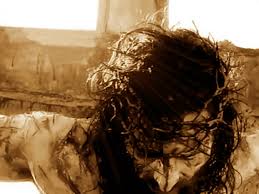
For He bore the sins of many, and made intercession for the transgressors (53:12e). Isaiah has spelled out on several occasions that the Servant of the LORD would suffer. The great burden of Chapter 53 has been to give us the reason why the Servant will suffer. Now Isaiah has finally given us the answer: He was going to suffer to pay for sin by way of substitution. And the concept of substitutionary sacrifice and death comes nine times in this section: (1) But He was pierced for our transgressions (53:5), (2) He was crushed for our sins (53:5), (3) The punishment that brought us peace was upon Him (53:5), (4) And by His wounds we are healed (53:5), (5) The LORD has laid on Him the iniquity of us all (53:6), (6) For He was cut off from the land of the living; for the crimes of My people, who deserved the punishment themselves (53:8 CJB), (7) God makes His life a guilt offering (53:10b), (8) He will bear their iniquities (53:11b), and (9) For He bore the sin of many (53:12e).
This great Chapter 53 of Isaiah gives a tremendously complete picture of what the death of Jesus Christ accomplished on the behalf of Isra’el (John 11:49-51), for the whole world (First John 2:2), and for you and me. His death satisfied God’s righteous demands for judgment against your sin and opened the way for you to come to the LORD in faith for salvation from your sins.223



